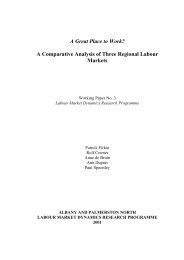The Law and Alternative Working Arrangements. - Labour Market ...
The Law and Alternative Working Arrangements. - Labour Market ...
The Law and Alternative Working Arrangements. - Labour Market ...
You also want an ePaper? Increase the reach of your titles
YUMPU automatically turns print PDFs into web optimized ePapers that Google loves.
solely on the basis that the contract had expired or had been rolled over a number oftimes <strong>and</strong> not been renewed. 15Despite the contractual approach of the Court of Appeal, cases continued to comebefore the Employment Court challenging the concept of the fixed-term contract. InLakel<strong>and</strong> Health Ltd v Joseph [1997] 1 ERNZ 425, the Employment Court rejectedthe claim by the employer that a consultant anaesthetist was on a fixed-term contract.<strong>The</strong> reasons for this were that the contract had no formal expiry date but provided fortermination on notice. <strong>The</strong>re was also provision for annual performance reviews <strong>and</strong>evidence showed the parties did not intend to enter into a fixed-term contract. In ViceChancellor University of Canterbury v Purchas 1998 3 ERNZ 925 (CA), it was heldthere was an implied term that Mr Purchas would be appointed to a tenured positionin the fixed-term contract. <strong>The</strong> Court in this case distinguished Hagg <strong>and</strong> found infavour of Mr Purchas, despite the express terms of the contract.It is clear that the original intention behind Section 66 of the Employment RelationsAct 2000 was to return to the pre-Hagg law but the section as finally enacted does notgo as far as the original clause contained in the Employment Relations Bill. <strong>The</strong> Actrequires in relation to fixed-term arrangements that:1. An employee <strong>and</strong> an employer may agree that the employment will end -a) At the close of a specified date or period; orb) On the occurrence of a specified event; orc) At the conclusion of a specified project.2. Before an employee <strong>and</strong> employer agree that the employment of the employeewill end in a way specified in subsection 1 the employer must –a) Have genuine reasons based on reasonable grounds for specifyingthat the employment of the employee is to end in that way; <strong>and</strong>b) Advise the employee of when or how his or her employment will end<strong>and</strong> the reasons for his or her employment ending in that way.3. <strong>The</strong> following reasons are not genuine reasons for the purposes of subsection2 a:a) To exclude or limit the rights of the employee under this Act:b) To establish the suitability of the employee for permanent employment.While employers will not be able to use fixed-term agreements to avoid the rightsowed to employees under the ERA, it remains clear that as long as the termination isnot treated as a dismissal the courts will be entitled to conclude that the contractexpired on the occurrence of one of the events in Section 66(1) (a) (b) or (c) <strong>and</strong>provided that there are genuine reasons for the agreement ending in that way.<strong>The</strong>re have been a number of determinations issued by the Authority in relation to s66 of the Act. <strong>The</strong> case of Miller v Red Bull NZ Ltd, P Cheyne (18 April 2002 CA42/02) was an application for reinstatement. Ms Miller was employed as a br<strong>and</strong>consultant for Red Bull NZ Ltd on two fixed-term contracts. <strong>The</strong> first was for a year<strong>and</strong> the second for six months. Both agreements were expressly stated to be made15 As a result of Hagg, the mere fact that a fixed-term contract was rolled over did not give rise to aclaim of legitimate expectation or that the contract was a sham.13




